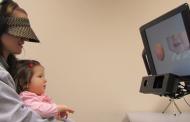
By age 6 months, infants on the verge of babbling already know — at least in a budding sense — the meanings of several common nouns for foods and body parts, a new study finds.
Vocabulary learning and advances in sounding out syllables and consonants go hand in hand starting at about age 6 months...
By age 6 months, infants on the verge of babbling already know — at least in a budding sense — the meanings of several common nouns for foods and body parts, a new study finds.
Vocabulary learning and advances in sounding out syllables and consonants go hand in hand starting at about age 6 months, say graduate student Elika Bergelson and psychologist Daniel Swingley of the University of Pennsylvania. Babies don’t blurt out their first words until around 1 year of age.
Bergelson and Swingley’s evidence that 6-month-olds direct their gaze to images of bananas, noses and other objects named by their mothers challenges the influential view that word learning doesn’t start until age 9 months.
“Our guess is that a special human desire for social connection, on the part of parents and their infants, is an important component of early word learning,” Bergelson says. The work is published online the week of February 13 in the Proceedings of the National Academy of Sciences.
In the study, 33 infants ages 6 to 9 months and 50 kids ages 10 to 20 months sat on their mothers’ laps in front of a computer connected to an eye-tracking device. Even at 6 months, babies looked substantially longer, on average, at images of various foods and body parts named by their mothers when those items appeared with other objects.
Kids as young as 6 months, for example, looked longer at a picture of hair paired with a picture of a banana when their mothers said “Look at the hair,” relative to time spent looking at a hair image when their mothers said “Look at the banana.” Infants also homed in on the nose on a woman’s face after their mothers said “Do you see the nose?”
Tots’ recognition of words for foods and body parts shot up at age 14 months, possibly due to improved understanding of sentences and of the experiment as a game of object searching, Bergelson suggests.
Although mothers in the new study generally did not realize that their 6- to 9-month-olds were familiar with food and body-part words, babies show signs of recognizing mommy, daddy and other frequently heard words by those ages.
That’s not the same as understanding what those sound patterns mean. Six- to 9-month-olds either understood that certain spoken sounds stood for specific objects or that particular utterances regularly accompanied the appearance of specific objects, says psychologist Richard Aslin of the University of Rochester in New York.
Still, Bergelson and Swingley show that 6- to 9-month-olds can discern words in spoken sentences, match sound patterns to objects, form categories for common objects and recall that information as needed, says psychologist Colleen McDonough of Neumann University in Aston, Pa.

 Previous page
Previous page Back to top
Back to top







